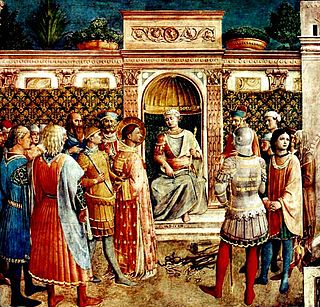
The Diatessaron is the most prominent early gospel harmony, and was created by Tatian, an Assyrian early Christian apologist and ascetic. Tatian sought to combine all the textual material he found in the four gospels—Matthew, Mark, Luke, and John—into a single coherent narrative of Jesus's life and death. However, and in contradistinction to most later gospel harmonists, Tatian appears not to have been motivated by any aspiration to validate the four separate canonical gospel accounts; or to demonstrate that, as they stood, they could each be shown as being without inconsistency or error.
Eusebius was a Roman historian, exegete and Christian polemicist.

Year 466 (CDLXVI) was a common year starting on Saturday of the Julian calendar. At the time, it was known as the Year of the Consulship of Leo and Tatianus. The denomination 466 for this year has been used since the early medieval period, when the Anno Domini calendar era became the prevalent method in Europe for naming years.
Tatian of Adiabene, or Tatian the Syrian or Tatian the Assyrian, was an Assyrian Christian writer and theologian of the 2nd century.
Agricola, the Latin word for farmer, may also refer to:
Flavius Rufinus was a 4th-century East Roman statesman of Aquitanian extraction who served as Praetorian prefect of the East for the emperor Theodosius I, as well as for his son Arcadius, under whom Rufinus exercised significant influence in the state affairs.

A consul held the highest elected political office of the Roman Republic, and ancient Romans considered the consulship the second-highest level of the cursus honorum after that of the censor. Each year, the Centuriate Assembly elected two consuls to serve jointly for a one-year term. The consuls alternated in holding fasces – taking turns leading – each month when both were in Rome and a consul's imperium extended over Rome and all its provinces.

The Column of Marcian is a Roman honorific column erected in Constantinople by the praefectus urbi Tatianus (450-c.452) and dedicated to the Emperor Marcian (450-57). It is located in the present-day Fatih district of Istanbul. The column is not documented in any late Roman or Byzantine source and its history has to be inferred from its location, style and dedicatory inscription.

Quintus Junius Rusticus, was a Roman teacher and politician. He was probably a grandson of Arulenus Rusticus, who was a prominent member of the Stoic Opposition. He was a Stoic philosopher and was one of the teachers of the emperor Marcus Aurelius, whom Aurelius treated with the utmost respect and honour.
Spurius Postumius can refer to a number of different people from Roman history:
Flavius Celer was a Byzantine general and magister officiorum under Emperor Anastasius in the early 6th century.
Eutropius is a Greek personal name. It may refer to:
Flavius Eutolmius Tatianus was a Senator of the Late Roman Empire.
Saint Hilarius of Aquileia, also Hilary of Aquileia was an early Bishop of Aquileia, a martyr and saint.
In Greek mythology, Phorbas or Phorbaceus was the sixth king of Argos.
Titus Atilius Rufus Titianus was a Roman senator, who was active during the first half of the second century AD. He was consul ordinarius in the year 127 with Marcus Gavius Squilla Gallicanus as his colleague. Paul von Rohden has suggested Titianus may be the son of Titus Atilius Rufus, suffect consul in some nundinium before the year 80. Nevertheless, Titianus was a member of the gens Atilia.
This page is based on this
Wikipedia article Text is available under the
CC BY-SA 4.0 license; additional terms may apply.
Images, videos and audio are available under their respective licenses.




